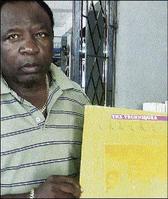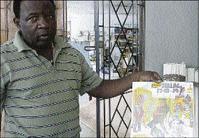Krista Henry, Staff Reporter
Producer and member of the Techniques, Winston Riley, goes back to his days with the group
Winston Riley has a claim to being the most successful reggae producer of all-time. His rhythm, Stalag, was dubbed by reggae artiste Freddie McGreggor as "the wickedest riddim in the world", with 400 known versions.
Born in 1946 in Kingston, Riley's entry into the music arena was at 16 years old in 1962, when he formed The Techniques harmony group, which recorded their first tracks for Coxsone Dodd of Studio One, and then later recorded for 'Duke' Reid. By 1970, Riley had moved from singing to production, producing artistes like Boris Gardner, The Escorts and Johnny Osbourne. Riley set up his own Techniques label in 1970 and scored an international smash with Dave & Ansel Collins Double Barrel and then Monkey Spanner.
Riley remained on the cutting edge introducing the world to slackness, via General Echo's debut album. He later went on to record seminal singles and albums for the likes of General Echo, Sister Nancy, Frankie Paul, Sanchez, Buju Banton, Courtney Melody, Super Cat and Red Dragon. From veterans like Gregory Isaacs to Tiger and Pliers, Riley worked with the best, and made them shine even brighter. More than 40 years after he started in the reggae music business, Riley is currently building a studio/museum at Techniques records to remember the late greats.
Sunday Gleaner: How did you get started in the business?
Winston Riley: I started in west Kingston in a band at Chakka Molong, which was a place that Mr Seaga founded. We started to sing there, but we used to sing at school concerts as well.
As a yute in the ghetto there wasn't much for you to do than find something to do, the easiest thing we had was singing. I sing at Kingston Senior School; when I was there I founded the group, Techniques, which consisted of Keith 'Slim' Smith, Frederick Waite, Frankyn White and myself Winston Riley ... We started getting into some one and one shows such as singing wid Byron Lee sometimes.
We had a place called Desperanza, a place in west Kingston, a singing competition, and if yuh not suitable a guy stone yuh down. So yuh haffi try do your best. I can remember this was a special day in my life when I sing at Majestic and Vagrant time ... These contests you haffi go wid a team of guys and pay dem or they will stone yuh down. I won this Friday night. I was told I was gonna be coming on air at 1 p.m. I went home and told everyone in the area. When I hear myself that day I so happy.
What happened after that?
We got the group together, start rehearsing for the band, sing at a lot of schools. I form di group, write for the group, lead the group ... Then we did our first recording with Major Lance; Edward Seaga introduced us to him. Did a tune with him and Major Lance told us we sounded great, we carried a fantastic harmony. After we did that we started to appear in a series of shows going all around the country.
At the period we had a single bed, four big boys on a single bed, so you can imagine what we go through to reach where I am today. We did a tour with Byron Lee - he was very good to us; when he kept a show you were well protected, well taken care of. Him mek this business a lot.
During dat time Ken Boothe and Strange Jah Cole came down and heard us singing and introduced us to Duke Reid. We went and sang he said we we're all right. The first tune we did for Duke was Little Did You Know, then I'm In Love, Telling Lies, When Your Wrong, I'm In The Mood For Love, My Girl, Love Is A Gamble. Then we started to have problems in the group. We started breaking up. Sometimes you may be the leader but you have people dictating and some don't want to follow orders ... We did bring in Pat Kelly."
For how long were the Techniques together?
We were together fi around 20-odd years, but we started to phase out gradually. But as long as I am here di Techniques are still here.
Why did you eventually go into producing instead of being an artiste?
Yuh see yuh require all part of di game when yuh have di ability, because yuh go there and see how di market situate and see what yuh can achieve from it. It's a hard road ... turning into a producer is a very good ting, yuh achieve a great goal, but is not an easy road. The artiste demselves call yuh a tief, no matter wha yuh do fi dem. I used to say dat once too until I become a part of di game. A producer pay yuh for your ability ... Is a game and a challenging one, but what we neva know then was that writing was a great thing.
Were you close to your fellow Techniques member Slim Smith?
Yeah man, very close.
How did his death affect you and what did you think about the circumstances?
Well, let me seh sumting. Yuh young one thing, then di next ting is yuh future and yuh main concern living in di ghetto is to get out. So when dat happen you'll feel a way, but it nah go hurt yuh to dat extent. Di way in which him died yuh nah go think about it cause it unfortunate, but it nah go hurt because yuh have other tings thinking about. Is not to say I not gonna remember him, but yuh nah go pressure yuh mind wid it.
You produced songs with Johnny Osbourne. Do you think he is an exceptional singer?
Brilliant, very brilliant. Every tune I sing I sing the back round vocals dat is very special. I sing all of dem wid Johnny Osbourne, help arrange and help write songs wid him.
Which is your favourite song of all your productions?
Well, I have one name The Heart of A Man, some I write wid Frankie Paul, Sister Nancy, Stalag is a nice tune for me, love songs like the ones wid Sanchez. Boops by Supercat very good.
Your son, disc jockey Kurt Riley is in the business. What do you think of his career?
Him is brilliant, brilliant, very good player and him can co-ordinate music very good.
What have you got working on now?
WR: I'm about to do one show and stop. I won't continue. I'm working on my studio and my museum and I'm planning on keeping some big shows. In the museum I gonna bring every thing up to date and have some documentary.
I gonna have each individual musician who are foundation member on di wall so tourist can come and view and a story underneath each poster.
Plus I gonna write some books and describe what these artistes do. I also wanna build a kindergarten school, but the museum is my dream when it is finished.

Producer Winston Riley holds up his renowned Stalag rhythm collection. -

